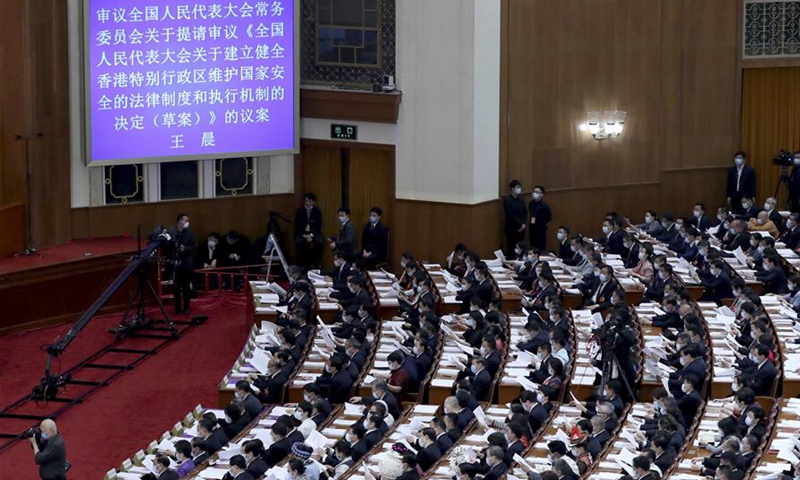Draft decision on HK national security law submitted to top legislature, stresses zero tolerance to secessionism, foreign interference
By Chen Qingqing Source:Global Times Published: 2020/5/22 15:18:51

The third session of the 13th National People's Congress (NPC) opens at the Great Hall of the People in Beijing, capital of China, May 22, 2020. (Xinhua/Liu Weibing)
A draft decision on establishing and improving the legal system and enforcement mechanisms for the Hong Kong Special Administrative Region (HKSAR) to safeguard national security was submitted to China's top legislature for deliberation on Friday.
Wang Chen, vice chairman of the National People's Congress (NPC) Standing Committee, explained the draft decision to the NPC deputies at the third session of the 13th NPC, outlining the necessity and importance of formulating the law in defending the sovereignty and core interests of the country.
The central government has zero tolerance toward any activities challenging the bottom line of the "one country, two systems," and it would not allow any acts of secessionism, the draft document said while highlighting the necessity of improving the legal system and enforcement mechanisms for Hong Kong to safeguard national security.
The draft entrusts the NPC Standing Committee to formulate relevant laws on establishing and improving the legal system and enforcement mechanisms for the HKSAR to safeguard national security. Besides, the NPC Standing Committee will exercise its functions and powers of legislation under authorization, Wang said.
It also stipulates that the relevant legal obligations of the NPC Standing Committee are to effectively prevent, stop, and punish any activity occurring in the HKSAR turf that are attempted to split the country, subvert state power, organize and perpetrate terrorist activities, including other actions that seriously endanger national security.
The draft also calls for an end to the interference of foreign and external forces in the affairs of the HKSAR.
After the issuance of the decision, the NPC Standing Committee will work with related parties to formulate relevant laws at an earlier date for the HKSAR to safeguard national security, actively push for resolving pressing issues in the HKSAR's national security system, bolster the establishment of special institutions, enforcement mechanisms and law enforcement forces, so as to ensure the relevant laws' effective implementation in the HKSAR, Wang said.
Li Xiaobing, an expert on Hong Kong, Macao, and Taiwan from the Nankai University in Tianjin, told the Global Times if there are special requirements, the committee might convene temporary meetings, "accelerating the legal process of the national security law for Hong Kong, which is expected to be passed within half a year, or even sooner."
The NPC Standing Committee makes the decision to include relevant laws into Annex III of the Basic Law of the HKSAR, and the HKSAR promulgates and implements them, according to the decision.
Since the return of Hong Kong to the motherland, China has been resolutely implementing the principles of "one country, two systems," "the people of Hong Kong governing Hong Kong," and a high degree of autonomy, Wang said, noting the practice of the principles have achieved unprecedented success in Hong Kong.
However, during its practice, new circumstances, new problems, and new challenges, with visible threats to the national security in the HKSAR, have also emerged, the vice chairman said.
Referring to the social unrest triggered by the withdrawn extradition bill in Hong Kong in 2019, and the anti-mainland forces that sparked chaos and troubles in the SAR, he said, these activities have openly instigated secessionism in Hong Kong.
The unrest seriously damaged the unification of the country and harbored separatist activities. Radical protesters bluntly desecrated the national flag, defaced national emblem, and ignited anti-mainland, anti-Party sentiments in Hong Kong.
Wang also emphasized in recent years, foreign forces have been openly interfering in Hong Kong affairs through legislature, administration, and non-government organizations, and created a fuss by supporting anti-mainland forces and activities, which seriously challenged the bottom line of "one country, two systems. "
In addition, such meddling by foreign forces harmed the rule of law, and threatened national sovereignty, security, and development interests in Hong Kong.
Considering Hong Kong's current situation, efforts must be made at the state-level to establish and improve the legal system and enforcement mechanisms, for the HKSAR to safeguard national security, to change the long-term "defenseless" status in the field of national security, Wang noted.
"Sovereignty is a top priority, there is too much interference of foreign powers, NED/CIA in Hong Kong," Angelo Giuliano, an observer of Hong Kong affairs, told the Global Times, noting that these forces are plotting a color revolution.
"The only way to prevent further chaos is to reinforce sovereignty of China over Hong Kong," he said.
Posted in: SOCIETY